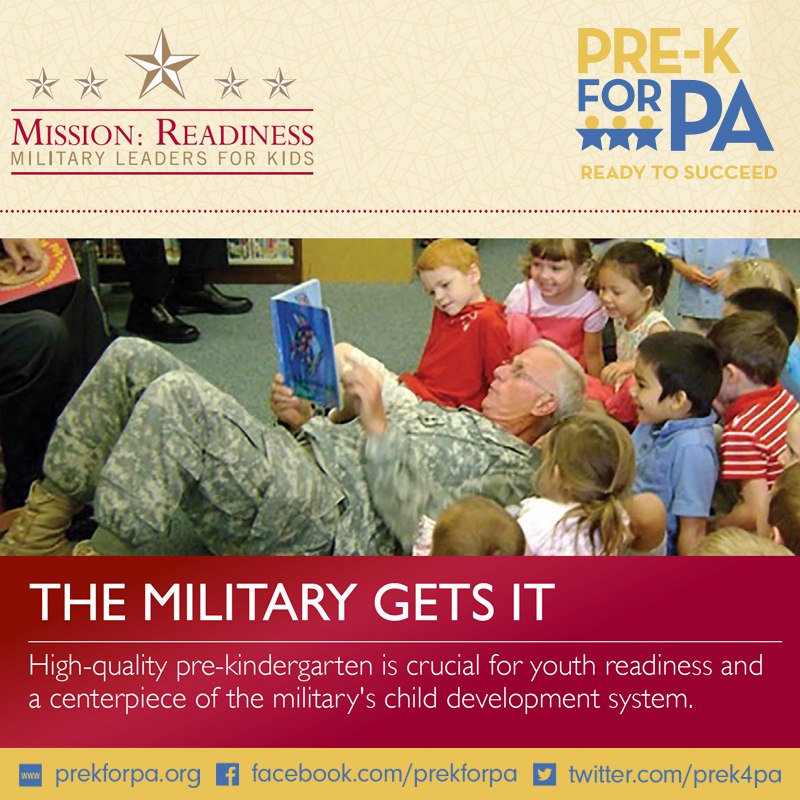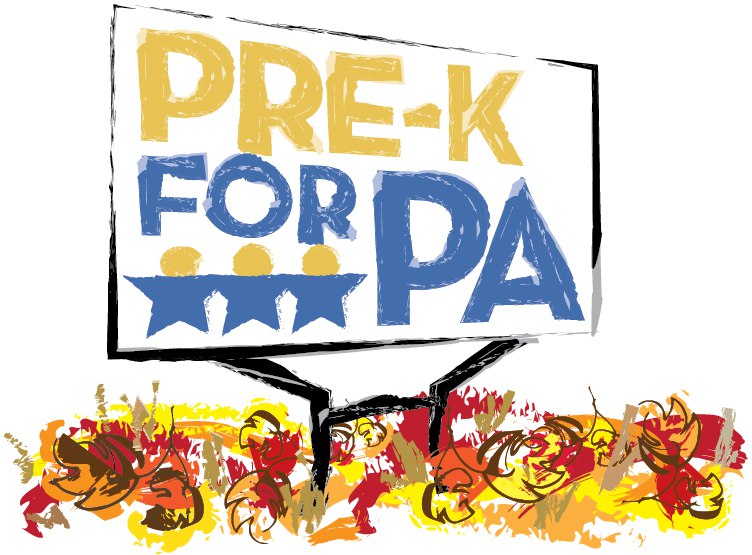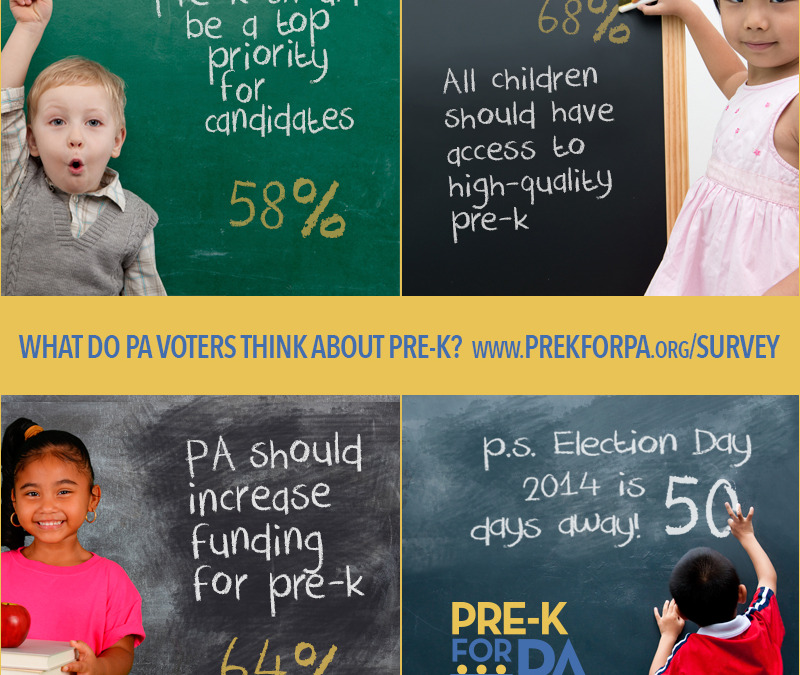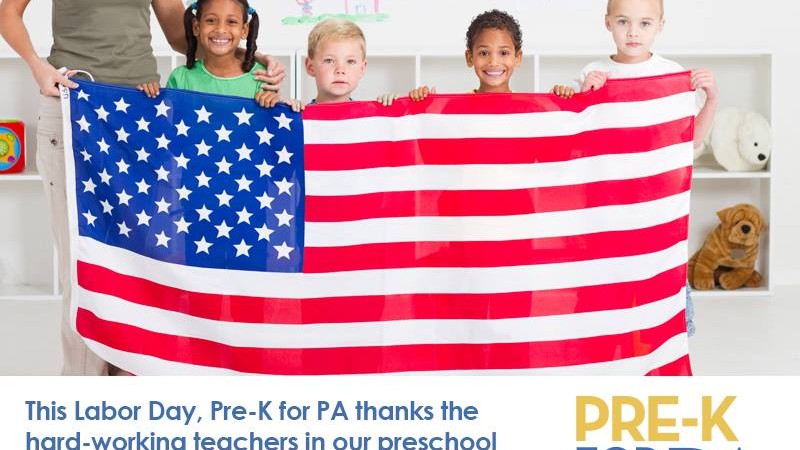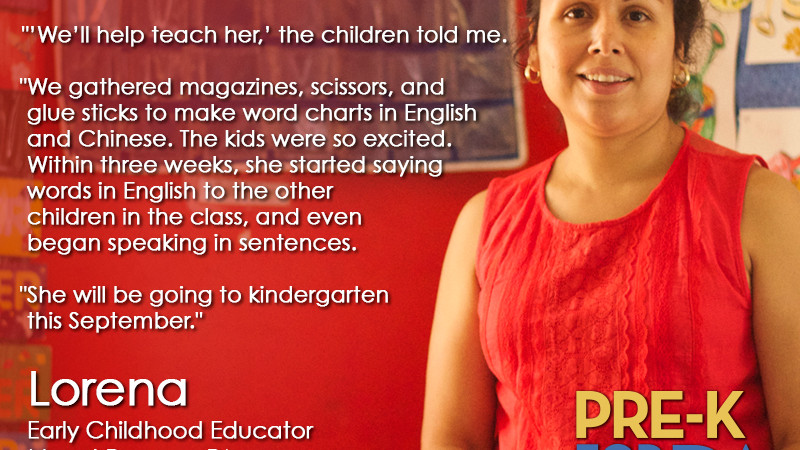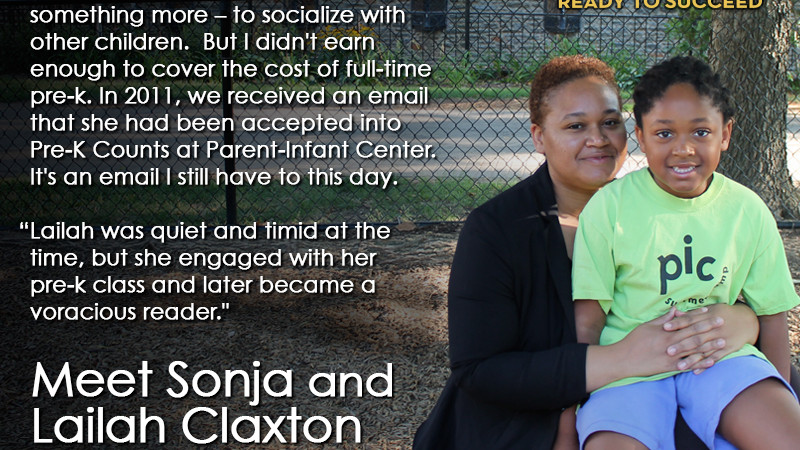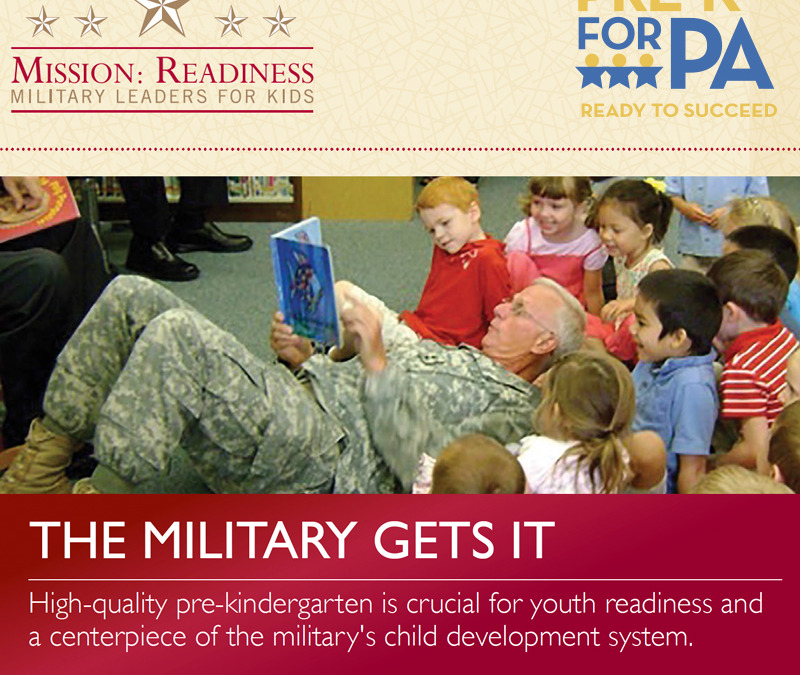
New Report: The Military Gets It (Pre-K)
72% of young Pennsylvanians are ineligible for military service. Mission:Readiness and Pre-K for PA released a new report, highlighting retired PA generals who call for better access to high-quality pre-k and tout the military’s universal access early learning system as a model.
Contact: Steve Doster
Cell: 717-343-6403, steve@missionreadiness.org
| SHARE: The Military Gets It (Facebook):
Post by Pre-K for PA.
|
SHARE: The Military Gets It (Twitter)
|
FOR IMMEDIATE RELEASE
New Pentagon Data: 72% of Young Pennsylvanians Ineligible for Military Service
Retired PA generals release report calling for better access to high-quality pre-K; tout military’s universal access early learning system as model for state;
and launch northeast regional Pre-K for PA Campaign with local supporters.
WILKES-BARRE, PA (September 30, 2014)—Three retired Pennsylvania generals visited King’s College Early Learning Center today to release a new report calling for better access to high-quality pre- kindergarten for the sake of future national security. The new report documented how high-quality pre- kindergarten can help children succeed in school, stay physically fit, and avoid criminal involvement, opening the doors to college, careers and the military for those who choose to serve.
The retired generals – Dennis L. Benchoff, Lieutenant General, U.S. Army (Ret.), Daniel J. O’Neill, Major General, U.S. Army (Ret.) and Joseph F. Perugino, Major General, U.S. Army (Retired) — were joined by local business, civic and education leaders.
General O’Neill, a former Wayne County school superintendent, cited new Pentagon data that 72 percent of young Pennsylvanians are unable to serve in the military for three primary reasons: they are too poorly educated, they are physically unfit, or they have a criminal record. He emphasized research included in the report that quality pre-kindergarten experiences enable children to build the pre-math, pre-literacy and social skills that are vital to academic success when they begin school, making it less likely they will fall behind or eventually drop out.
“This high level of ineligibility among our youth is unacceptable as our current military involves complex technology and systems unimagined in past generations,” said General Perugino. “We need young men and women who can think critically, work well in teams, and make decisions under pressure. Increasing access to high-quality pre-K programs will result in more kids being prepared for college, the workforce and the military down the road.”
According to data cited in the report, more than 200,000 three- and four-year-olds lack access to high- quality pre-kindergarten in Pennsylvania, and more than 12,000 three- and four-year-olds lack access in northeast PA counties alone.
General Benchoff noted that the Department of Defense understands the importance of early education and has prioritized the development of exemplary pre-kindergarten programs – like those found at Tobyhanna Army Depot over the past 30 years. “High-quality pre-K programs are a centerpiece of the military’s Child Development System that is available to all active-duty military families,” said General Benchoff. “This system is recognized by experts as a model for the nation in terms of access and quality.
Pennsylvania’s policymakers should take the military’s lead and ensure access to high-quality pre-K for all of our children.”
Other major findings from the Mission: Readiness report entitled, The Military Gets It: High-quality pre- kindergarten is crucial for youth readiness and a centerpiece of the military’s child development system, include:
- One in five students nationwide and 16 percent in Pennsylvania do not graduate from high school on time.
- Of those who do graduate and try to join the military, more than 1 in 5 nationwide and 22 percent in Pennsylvania cannot score highly enough on the military’s entrance exam to be able to serve.The report highlights studies of high-quality early education programs that show impressive education and crime prevention outcomes:
- Participants in New Jersey’s preschool program, which serves children across the state, were three-fourths of a year ahead in math and two-thirds of a year ahead in literacy when they reached the fourth and fifth grades. They were also 31 percent less likely to be in special education and 40 percent less likely to be held back in school.
- Participants in the Chicago Child-Parent Centers preschool programs, which have served over 100,000 at-risk children, were 29 percent more likely to have graduated from high school, and those who were left out of the program were 70 percent more likely than participants to have been arrested for a violent crime by age 18.The Mission: Readiness report was released as part of a new statewide and regional campaign effort known as Pre-K for PA. Business and community supporters from the Wyoming Valley United Way, Hildebrandt Learning Centers and Luzerne County Head Start were on hand at the event to formally launch the Campaign’s northeast PA efforts.Pre-K for PA is an issue education campaign supported by thousands of individuals and hundreds of organizations across Pennsylvania who believe that every 3- and 4-year-old in the Commonwealth should have access to high-quality pre-K. Supporters of the campaign have been working to elevate this issue among those candidates for public office in this 2014 election cycle. Pre-K for PA is a non-partisan, 501(c)3 effort and will not endorse nor oppose candidates for office.To learn more about the Pre-K for PA campaign, please visit www.prekforpa.org.
###
Mission: Readiness is the nonpartisan national security organization of more than 450 retired generals and admirals calling for smart investments in America’s children. It operates under the umbrella of the nonprofit Council for a Strong America.

